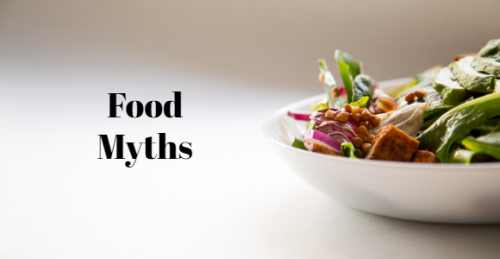4 Popular Food Myths Debunked
Here’s the truth on four popular myths about dieting.
When you hear diet myths often enough, you may start to assume they’re true.
Some diet myths, like the belief that “as long as you exercise, you can eat as much as you want,” almost make sense.
Others, like “cookie crumbs don’t count,” simply fall into the territory of wishful thinking.
Many diet myths come and go, but some have stood the test of time. Why do we hang on to these food myths, even if we know they might not be true? Often it’s because the ideas behind the food myths just seem to make sense—and so we want to believe them.
With so much information and misinformation available at our fingertips, it’s not too difficult to find a source that supports what we hope to be true about our diet. Think of any popular strategy for weight loss that you’ve heard, and then do an Internet search. You’ll probably find just as many sites that support that strategy as those that debunk it.
Here are four of the most common dieting myths, and why they simply aren’t true:
1) Weighing yourself daily can be discouraging when you’re trying to lose weight. food myths
Truth: Your body weight fluctuates from day to day. Sometimes it can be by as much as a couple of pounds. If you weigh yourself every morning, you’ve probably experienced this, especially after you’ve had a heavy dinner the night before. Yet many people believe that if you don’t see a consistent daily drop in your body weight, you’ll get discouraged and abandon your efforts. Instead, several studies have shown that those who keep daily tabs on their weight are more likely to lose weight and keep it off.
2) Carbohydrates are fattening. food myths
Truth: Carbs tend to have a bad reputation among dieters, but that’s largely due to the fact that don’t understand carbs. To most people, carbs means starchy foods like white bread or white rice or potatoes, or maybe sugars and sweets. Those are carbs, to be sure. But you can also find carbs in healthy foods like fruits, vegetables, beans and whole grains. So, to lump all those foods together and claim them as fattening just isn’t right.
What matters is this: the healthy carb sources are simply more filling than the highly processed, not-so-healthy-for-you carbohydrates. These are the sugary drinks, sweets and refined flour breads, cereals, crackers and so forth. So, it can be pretty easy to take in quite a few calories from these refined carbs, hence their fattening reputation. And there are times when it’s tempting to choose these less healthy options. Many people turn to sweets and carbs for comfort when they’re tired or stressed. But the stress relief will only be momentary––while the extra pounds may stay with you a lot longer.
On the other hand, high-fiber vegetables, whole grains, beans and fruits fill more than refined carbs, so stick with them.
3) Eating close to bedtime will make you gain weight.
Truth: Many people believe that eating calories late in the day are somehow more fattening than when they eat them earlier in the day. The idea is that you should eat more calories during the hours you’re active so you can burn them off. And that, if you take in calories right before you go to sleep, you just store them away since you won’t be using them. But if you take in more calories than you need at any time of the day, you’ll store them away.
One reason this weight related myth persists is because many people lose weight when they assign an early cutoff time to their eating. It isn’t because they stopped eating sooner than they used to, it’s just that they stopped eating—period. But that might not work for you, especially if you’re a night owl. If you’re up late studying, you may need some fuel during the evening to keep going. The trick is to save up some calories during the day so you can spend them on some healthy snacks in the evening. Which brings us to Food Myth #4…
4) Snacking is a bad habit that contributes to weight gain.
Truth: Snacking is often seen as a bad habit for a couple reasons. Some people think it will add excess calories on top of the calories you need for the day. And many people think snacks only serve to dump lots of fat, salt, sugar and calories into your system. It’s true that not everyone snacks wisely. Plenty of people do snack on high calorie, nutrient-poor foods that contribute plenty of extra calories. But when it’s done wisely, snacking can be a healthy habit that can keep your weight in check, and can help keep your energy levels up throughout the day. Plan for smarter snacking and rather than waiting until you’re hit with a snack attack, keep healthy snacks––like whole fruits, yogurt, some nuts or a protein bar––in your bag to avoid getting tempted by the junk.
source – discovergoodnutrition.com
Follow us
